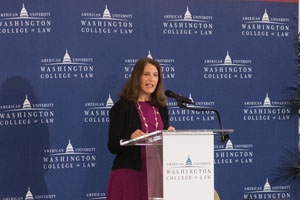On Campus
Clarity Amid Uncertainty: AUWCL Conference Looks at Next Steps in Health Care Reform

If there’s one word that sums up the state of US health care, it might be uncertainty. Congress failed to replace the Affordable Care Act, prompting President Donald Trump to sign an executive order on October 12 directing federal agencies to scale back health insurance regulations. Senators Lamar Alexander (R-Tenn.) and Patty Murray (D-Wash.) recently forged a tentative deal to fund subsidies that reimburse insurance companies, in an attempt to stabilize the health care market.
In light of the tumultuous state of health care reform, the three-day “Next Steps in Health Reform 2017” conference was propitiously timed. Held October 26-28 at American University Washington College of Law, its co-sponsors included AU’s School of Public Affairs and Kogod School of Business, as well as the American Society of Law, Medicine & Ethics and the health institute at University of Toronto. The event also spotlighted AUWCL’s new health law and policy program.
AU president Sylvia Mathews Burwell gave a special address on the future of health reform on Friday, October 27. As the former Health and Human Services secretary under President Barack Obama, she’s an authority on the myriad health care reform issues facing the nation. Being on the front lines, she lightheartedly mentioned how ACA-related Supreme Court cases were filed under “Burwell” as HHS secretary.
“It was not one, but two lawyers who failed to warn me that once confirmed, all court cases switched to my name. The first, the Burwell family counsel—my husband, Stephen Burwell. The second, the 44th president of the United States of America. And I’m just saying, a little heads up would have been nice,” she joked.
Burwell discussed her new role as AU president, and AU’s role in finding solutions to pressing policy matters. “I’ve joined a passionate and engaged campus community thinking, learning, and doing things about the world’s most interesting and important problems. And one of those we are talking about here today,” she said.
Complexity and Simplicity
On health care reform, Burwell reflected on the progress that’s been made in recent years. “We’ve improved the quality of health care coverage for American families. And we have started to bend that cost curve—freeing up resources for today’s working families, and for future generations,” she said.
Yet she wasn’t just talking about the ACA—popularly known as Obamacare—that she helped implement. “This isn’t the work of government or business alone. It’s the work of policymakers and physicians, advocates and attorneys, patients and families. And as this conference proves, they’re not slowing down.”
Burwell also framed health care policy through a thought-provoking dichotomy: It’s so complex, yet so simple.
“From payment incentives, to federal and state coverage of young children, to the challenges facing payers and providers, this conference dips into the vast ocean of complex legal, regulatory, and moral questions that churn every day in our health care system,” she explained.
Yet that system is also grounded in a simple reality. “In moments of joy like births, or pain as in a sprained ankle, or fear and uncertainty as in a fight against cancer, we all count on this system to care for us and for our loved ones.”
HHS and the North Star
Burwell said that at HHS, impact was “our north star.” She praised the innovative work at the National Institutes of Health and the Food and Drug Administration, and the courageous people who traveled to West Africa to save families from Ebola.
She noted that between 2010 and the first quarter of 2017, the uninsured rate fell from 16 percent to 8.8 percent. Yet that still leaves plenty of Americans without insurance, she said. “Connecting these people with coverage is a problem of will, not strategy,” she argued. “Nearly half of uninsured adults say that the cost of coverage is prohibitive. Our nation can take steps to help them. We need to actively get the message out that coverage is available, especially to communities where those messages don’t often reach.”
Burwell stated that in January 2016, a quarter of all health care spending was in alternative payment models—which offer incentives for high-quality care—and that the delivery system reform movement has bipartisan support.
Burwell also sat down for a talk with Jeanne Lambrew, a former deputy assistant to President Obama for health policy who is now at the Century Foundation. At one point, Lambrew asked Burwell what advice she’d give to the next HHS secretary, since the current head is serving in an acting capacity.
She suggested that the new person should work to understand the incredible civil servants already at HHS, but she also mentioned the importance of visiting people outside the department. “The more that you can talk to [people], whether it’s CEOs, whether it’s Head Start kids, or visit the tribes, that is an important part of really understanding what you’re trying to get done,” said Burwell.
AU Traditions, AU Solutions
Other prominent voices on health care spoke on Friday, such as Independence Blue Cross CEO Daniel Hilferty, an AU alum (MPA ’81). There were also opening remarks from AUWCL dean Camille Nelson, SPA interim dean Vicky Wilkins, and Provost Scott Bass. SPA associate professor Taryn Morrissey moderated a panel on Private Insurance: Subsidies, Risk Adjustment, and Adverse Selection.
Toward the end of her speech, Burwell noted how AUWCL was the first law school founded by women, and those pioneers believed that a male-dominated system needed to change. She linked confronting health care developments with AU’s pathbreaking tradition.
“For years, and for decades, we’ve had conferences and events like this to discuss the complex challenges that stand in our way,” she said. “But with the leadership in this room and across the nation, I believe that we can overcome those challenges.”